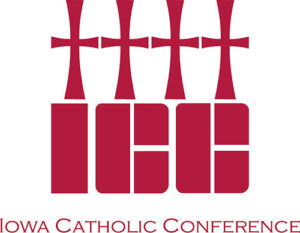 By Tom Chapman
By Tom Chapman
For The Catholic Messenger

The U.S. Conference of Catholic Bishops (USCCB) has created a special page to honor the life and legacy of Pope Francis, who died April 21. The conclave to elect Pope Francis’ successor is set to begin May 7. Iowa Gov. Kim Reynolds ordered all flags lowered to half-staff in Iowa until after the pope’s funeral.
The Iowa Catholic Conference (ICC) encourages the faithful to contact their legislators through the ICC action alert page (iowacatholicconference.org/voter-voice) about these issues pending in the Iowa Legislature:
- Conscience protection for medical professionals, which the ICC supports. HF 571 would protect medical practitioners and entities from discrimination, punishment or retaliation due to exercising the right of conscience, a fundamental right of human beings. For more than 45 years, conscience protections have been included in Iowa Code Chapter 146 for medical professionals who have had religious or conscience objections to performing abortions. The ICC looks at the Med Act as being in a similar category.
- Immigration enforcement, which the ICC opposes as unnecessary. HF 572 would create the state crime of “smuggling of persons.” Federal and state law already prohibit trafficking in humans. The bishops are also concerned the bill could be interpreted to criminalize providing basic charity to immigrants. Please send a message in your own words to your state senator in opposition to HF 572.
- Medicaid changes, which the ICC opposes. SF 615 would affect the 180,000 members of the Iowa Health and Wellness Plan by adding work requirements for participants, with some exceptions. The wellness plan provides affordable health coverage through Medicaid to Iowans ages 19-64 whose income does not exceed 133% of the federal poverty level.
The Catholic Church values the dignity of work as a way of cooperating with God’s creation. However, about 75% of Iowa’s Medicaid recipients are already working. Those who are not often face barriers such as lack of education, struggles with mental health, substance abuse or a criminal conviction. Many recipients work in low-wage industries with low rates of employer-sponsored insurance. These same Iowans would likely have difficulty navigating the new reporting requirements, which also are added to the SNAP (food stamps) program. The proposal would add red tape and a costly new reporting system to track participants’ work hours and any exemptions. Eligible persons could lose coverage by failing to meet reporting requirements.
- Showing students a video on fetal development, which the ICC supports. SF 175 would ensure students could see and understand the miracle of life and its development in the womb. While the video would show the humanity of the unborn child, it would not contain religious content. The bill does not require usage of any specific video.
Last week at the State Capitol:
The governor’s preschool and childcare “continuum of care” proposal (SF 445) passed the Senate 33-14. It is eligible for debate in the House. The ICC supports the bill, which would allow community providers such as Catholic preschools to apply directly to the state for funding. Currently, community providers must work through the local public school district. Unfortunately, the number of students in Catholic preschools participating in the state preschool program has dropped this year. Some public schools do not allow Catholic preschools to participate.
Education Savings Accounts (ESAs) scholarship funding from the state remains a talking point for some legislators. New research from the Urban Institute highlights longer-term positive effects of school choice. Students who attend private school through a school choice program have significantly better postsecondary outcomes and are likelier to attend and graduate from college.
HF 248, which the ICC supports, passed unanimously. It requires businesses to provide adoptive parents the same benefits and family leave as biological parents. The bill now goes to the governor.
SF 288, which the ICC supports, requires state universities to make reasonable accommodations for students who are pregnant or who have recently given birth. The House amended the bill and sent it back to the Senate. The ICC expected the bill to be finished in the Senate this week.
Gov. Reynolds signed an Abortion Recovery Month proclamation that promotes healing opportunities and raises awareness of the issues experienced by individuals and families in the aftermath of abortion.
Contact Congress about religious visas
An increasing number of priests, religious sisters and brothers and others serving the Church throughout the United States will be forced to abandon their ministries if policymakers do not act soon on the temporary religious worker (R-1) visa. Under current law, foreign-born religious workers have permission to live and work in the United States temporarily with this visa.
Unfortunately, a significant backlog has developed in the R-1 visa category that religious workers and several other classes of immigrants rely upon. This backlog means a priest or other worker who applies today must wait more than a decade to receive permanent residency in the United States. This is unsustainable for the religious worker and the religious organizations that depend on them. This issue affects all four Catholic dioceses in Iowa. In the Archdiocese of Dubuque, for example, foreign-born priests represent about 25% of its active priests.
The bipartisan Religious Workforce Protection Act (RWPA) (S.1298/H.R. 2672), recently introduced in both chambers of Congress, would provide relief for religious workers in this situation and further the free exercise of religion in the United States for the benefit of all Americans. Ask our members of Congress to support this much-needed source of relief for people of faith and communities nationwide. The action alert is available on the USCCB website (votervoice.net/ USCCB/Campaigns/125641/Respond).
(Tom Chapman is executive director of the Iowa Catholic Conference, the public policy voice of Iowa’s bishops.)








